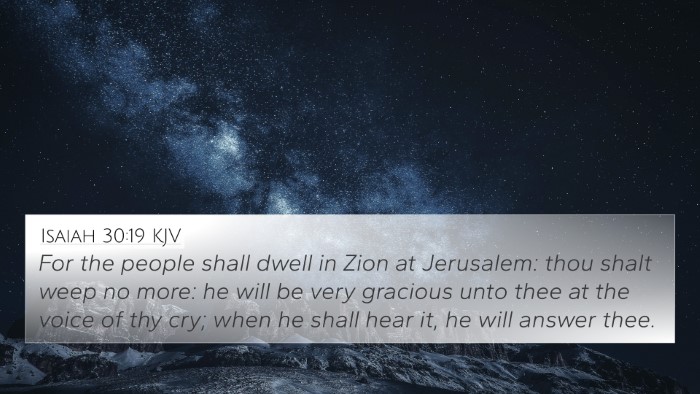Meaning and Interpretation of Job 33:26
Job 33:26 states, “He shall pray unto God, and he will be favorable unto him: and he shall see his face with joy: for he will render unto man his righteousness.” This verse captures a profound moment in the dialogue of Job, emphasizing themes of communication with God, divine favor, and the righteousness bestowed upon humankind. Understanding this verse requires examining its implications within the context of the surrounding chapters, as well as drawing on insights from public domain commentaries.
Exegesis of Job 33:26
Job 33:26 provides reassurance about the relationship between man and God, as articulated by Elihu, one of Job's friends. Elihu speaks about the importance of prayer and how it serves as a direct line of communication to God.
- Prayer as Communication: Elihu suggests that through prayer, an individual can invoke God's favor. The act of praying is seen as essential, as it is a natural response to adversity.
- God's Favor: This verse emphasizes that God is willing to extend His grace to those who seek Him sincerely. Matthew Henry comments on this openness of God to accept those who truly repent and seek Him.
- Seeing God's Face: The joy of "seeing His face" reflects the ultimate intimacy and acceptance from God. According to Clarke, this signifies a deep acknowledgment of one's righteousness by God, akin to a father recognizing his child.
- Righteousness Rendered: The idea that God will “render unto man his righteousness” suggests a divine reciprocity where human faithfulness is rewarded with justification and grace.
Public Domain Commentary Insights
This verse serves as an affirmation of spiritual reconciliation. According to Albert Barnes, Job 33:26 reassures believers of God’s readiness to listen and restore those who earnestly seek His intervention. Adam Clarke expands on this by illustrating that sincere prayer leads to restoration and understanding of one’s standing before God. Together, these commentaries stress that divine engagement is not a one-sided affair, but rather the joyous and hopeful anticipation of a response from God.
Cross-References to Job 33:26
To better understand the context and implications of Job 33:26, several Bible verses demonstrate thematic connections:
- Psalm 145:18: "The LORD is nigh unto all them that call upon him, to all that call upon him in truth." This emphasizes the immediacy of God’s response to sincere prayers.
- James 5:16: "The effectual fervent prayer of a righteous man availeth much." Reflects the power of diligent prayer in maintaining a righteous life.
- 1 John 1:9: "If we confess our sins, he is faithful and just to forgive us our sins, and to cleanse us from all unrighteousness." Reinforces the theme of confession leading to righteousness and forgiveness.
- Isaiah 30:18: "And therefore will the Lord wait, that he may be gracious unto you, and therefore will he be exalted, that he may have mercy upon you." This shows God's desire to be gracious and merciful to those who seek Him.
- Hebrews 4:16: "Let us therefore come boldly unto the throne of grace, that we may obtain mercy, and find grace to help in time of need." Stresses approaching God with confidence, paralleling the assurance of Job 33:26.
- Matthew 7:7: "Ask, and it shall be given you; seek, and ye shall find; knock, and it shall be opened unto you." This emphasizes the promise of response to those who earnestly seek.
- Proverbs 15:29: "The LORD is far from the wicked: but he heareth the prayer of the righteous." Illustrates God's attentiveness to those who walk in righteousness.
Thematic Connections and Cross-Referencing Insights
Thematic Bible verse connections can significantly enrich our understanding of Job 33:26. By cross-referencing, one identifies the consistent biblical narrative surrounding prayer and God's faithfulness to respond. This enables deeper engagement in Bible cross-reference guides and tools for understanding the holistic scripture.
Understanding Through Comparative Analysis
Engaging in comparative Bible verse analysis facilitates a richer understanding of God’s character. When considering Job 33:26 alongside other scriptures, one can discern the consistent theme of divine favor and the necessity for believers to communicate through prayer. The teachings of the Prophets resonate with the promises found in the New Testament, emphasizing that God’s nature remains unchanged across covenants.
Conclusion
Job 33:26 offers profound insights into the nature of prayer, God's readiness to engage with humanity, and the transformative power of righteousness. By using systematic cross-referencing Bible study methods, individuals can deepen their understanding of this verse and its connections. These connections weave a tapestry of scripture that reflects God's enduring promises to those who earnestly seek Him.


























